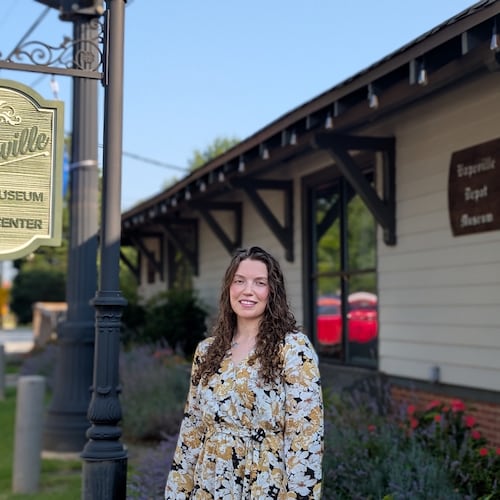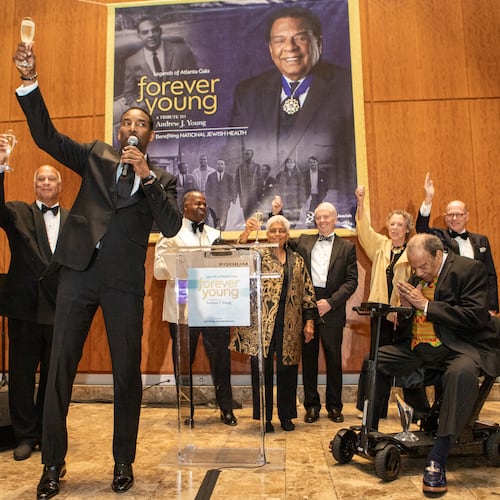Over 265 Black families once resided in Lynwood Park, a community founded on hard work and activism. Today, only about 30 of these families remain.
Lynwood Park is now part of the city of Brookhaven, where the median listing home price today is $689,000, increasing by 3.5% each year, but for decades the neighborhood was a haven of Black entrepreneurship, community and activism.
As the oldest Black neighborhood in Dekalb County, Lynwood Park was unique in how it got its start.
In the late 1890′s the Allen-Sanfords, a Black family, bought a 40-acre plantation from a white landowner near the line dividing DeKalb and Fulton Counties. In 1925, Black families migrated to the area, where properties were divided into 50-foot lots and sold for $250.
Throughout the years, hundreds of Black residents moved to the neighborhood, many before it established roads, electricity or running water.
In the 1930s, the first civic group of the community, the Twelve Ladies Sewing Club, raised funds to pave streets, erect streetlights, build schools and help establish telephone and electrical services.
These fundraising efforts resulted in the first Lynwood Park School, which opened in 1942 with the purpose of educating Black students. The funding also made possible the construction of a day care center and health clinic. Through the work of civic organizations, residents and churches, the community soon had eighteen paved streets, more schools, green space and a recreation center.
In 1947, Bishop Cornelius Sawyer, my grandfather, purchased a lot in Lynwood Park for $100. Now surrounded by miniature mansions priced around $1 million, my grandparents’ little blue home stands out as the only historic house left on Antioch Drive.
Jacqueline Sawyer, my aunt, is one of the last original residents of Lynwood Park. She occupies the house at 1113 Antioch, which my grandfather purchased.
“A lot of people don’t call it Lynwood Park anymore because everyone’s left, but I’m still here,” Sawyer said. “The spirit of my parents are in this house. I love it. I wouldn’t taking nothing for it.”
Credit: Ziyu Julian Zhu/AJC
Credit: Ziyu Julian Zhu/AJC
Barbara Ann Shaw remembers a man knocking on the door of her family’s home in 1998, with a briefcase full of money. She said he offered $50,000 for every resident willing to sell their homes to him.
According to Shaw, several people sold their homes that day. Her family was one of the only ones that refused.
“They wasn’t getting the value of [their home],” Shaw said. “Their parents worked hard to get this land and pay for this land. And [I’m] not speaking of jobs like we have, [I’m] speaking of maid work, butler work; and they actually sold it.”
Shaw has lived in Lynwood Park for over 62 years, and notes that the neighborhood she sees today is different from what it was before; and not just socioeconomically.
“Growing up in the neighborhood, we all were close-knit. We knew each other and knew each other’s families,” Shaw said. “But as the change occurred, we didn’t know the new people moving in. And they wasn’t trying to make themselves known, neither.”
In Shaw’s time, Lynwood Park was a community of thriving Black business, with grocery stores, laundromats, beauticians, barbers and churches lining the streets. Now residents drive miles to the nearest grocery store and further to see friends who once lived right up the street.
Credit: Past Tense GA
Credit: Past Tense GA
Shaw recalled a white neighbor moving near her house two decades ago, who shared that he’d been told all Black Lynwood Park residents would be gone in two years.
“After two years, he actually approached us and asked when we were moving,” Shaw said. “And [my husband and I] told him we had no intention of moving.”
Lynwood Park is not the first Atlanta city to undergo displacement and gentrification – and likely not the last. Its longtime residents have seen the changes happening to the communities around them and are now experiencing the same.
In the 1950s, city officials made an effort to link downtown Atlanta to its suburbs, constructing major interstates that tore through established Black communities like Peoplestown, Summerhill and Mechanicsville.
Around the 1980s and into the 2000s, gentrification met Old Fourth Ward, the historic birthplace of Martin Luther King Jr. and home of Ebenezer Baptist Church, which became ground-zero for Atlanta Beltline development.
In addition to new attractions, many attribute the current state of the city to the 1996 Olympics. In preparation for the global stage, city leaders attempted to market Atlanta as a clean, international hub with significant economic and civil rights progress. Over 30,000 low-income residents were then evicted or displaced.
A predominantly Black neighborhood called Lightning was also demolished to build the Georgia Dome, which was later demolished to construct Mercedes-Benz Stadium.
In 2014, St. Peter’s True Holiness Church was sold to developers. The plot where it once stood is now the site of a Windsor Parkway roundabout.
Credit: arvin.temkar@ajc.com
Credit: arvin.temkar@ajc.com
Michael Lyon, a newer resident of Lynwood Park who came in 2005, recalls learning the rich history of Lynwood Park on the front porch of my grandparent’s home. Lyon was told stories by my grandfather about the once dirt roads in front of their houses, and the businesses that once stood on each corner.
Though few historic residents remain in the area, the Lynwood Park Foundation has made efforts to record oral histories from them and is adding historical markers to sites in the area, according to Kathy Wells, the foundation’s president.
“We have worked closely with Brookhaven to make sure our history is told — that people who move into the community now as newcomers and even our kids will be able to see where they come from,” Wells said.
After over two years of petitioning from original Lynwood Park residents and help from former councilwoman Linley Jones, Lynwood Park was recognized as the first historic designation in Brookhaven in 2020.
Credit: Ben Gray
Credit: Ben Gray
According to Burke Brennan, Communications & Public Engagement Director for the City of Brookhaven, the future of Lynwood Park will be determined by what residents want. “The future is going to be whatever the community wants it to be,” Brennan said. “The government is here to serve the needs of the people that it serves.”
Since original residents account for just above 1% of the community’s voting population, they rely on current residents to amplify their voices, according to Wells.
“Our history is Brookhaven history,” Wells said. “And I wish more people would be more actively involved in this. They just aren’t.”
According to Wells, Black residents working closely with Dekalb County decades ago resulted in a cap on property taxes paid by senior citizens in the area. “We would have lost our property a long time ago in that area because the taxes were increasing all the time,” Wells said.
The foundation’s current goal, she says, is to continue working closely with the Brookhaven City Council, and to make historic residents feel welcomed in their community.
“Especially because a lot of the people are getting older, they’re kind of isolated where they’re living now,” Wells said. “They don’t have that sense of community.”
According to Shaw, it has become hard to recognize the streets they once grew up on and to feel like the community is still theirs. However, Shaw says it will always be their home.
“It will always be Lynwood Park,” Shaw said. “But it just won’t be what we know it as.”
Become a member of UATL for more stories like this in our free newsletter and other membership benefits.
Follow UATL on Facebook, on X, TikTok and Instagram.
About the Author
Keep Reading
The Latest
Featured




